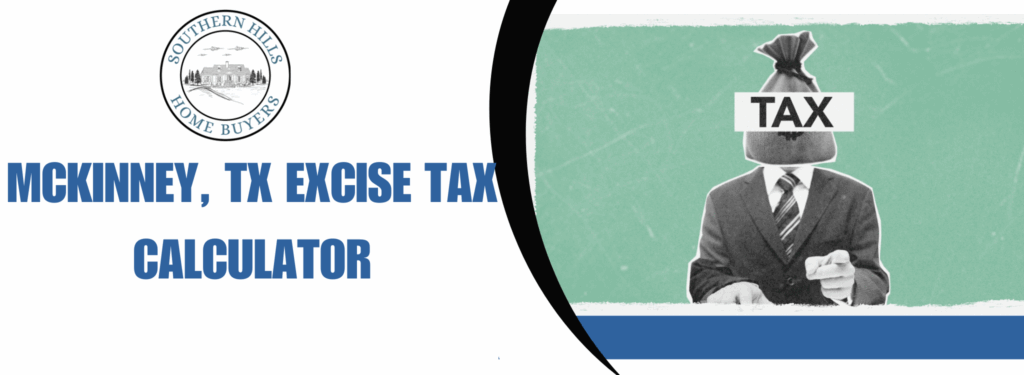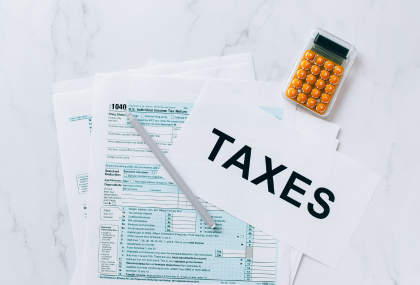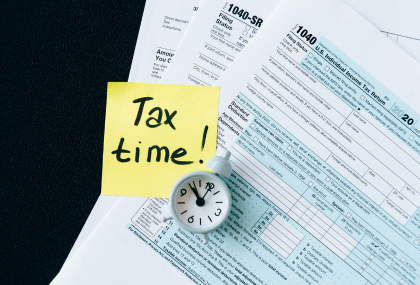
Exploring the History and Purpose of Transaction Taxes in the U.S.
Transaction taxes, including those applied to real estate deals, have long been part of the U.S. tax system. These fees are charged for specific actions, such as transferring property ownership, and were introduced in the early days of the American government to help fund national operations.

Transaction taxes have evolved over time. They continue to influence consumer behavior while helping fund public services and infrastructure. Real estate sellers in McKinney, TX, should use a transaction tax calculator to estimate their costs and make informed financial decisions accurately.
Understanding the rules and rates related to transaction taxes allows individuals to better manage the financial aspects of real estate deals. While often associated with government revenue, these taxes also serve broader purposes. They are levied on goods like gasoline, alcohol, and tobacco, not just to raise money but also to address the societal impact of their consumption and to encourage more responsible behavior.
With tools like the McKinney transaction tax calculator, users can confidently navigate the financial side of real estate transactions and ensure compliance with local regulations.
Understanding Transaction Tax Regulations in McKinney, TX
To get the most out of your real estate investments, it is important to understand the rules regarding transaction taxes in McKinney, TX. A transaction tax, a specific type of tax applied to certain goods or property transfers, can directly impact real estate deals in the area.
In McKinney, these taxes may vary based on the location and nature of the transaction. Understanding how they apply to real estate can help buyers and sellers make informed financial decisions.
Tools like the McKinney Transaction Tax Calculator help estimate the potential costs of buying or selling a property. Based on local regulations, this tool allows you to calculate how much transaction tax you may owe, helping you avoid unexpected expenses.
When real estate investors and homeowners in McKinney fully understand these tax policies, they are better equipped to make decisions that support their financial goals.
Comprehensive Guide to State and Local Transaction Taxes in McKinney
Maximizing your real estate investment in McKinney, TX, begins with understanding how state and local transaction taxes affect property deals. The McKinney-specific transaction tax calculator is a valuable tool that simplifies the process by accurately estimating the taxes owed during a real estate transaction.

State and local taxes can complicate buyers’ and sellers’ financial planning and decision-making. The McKinney transaction tax calculator follows current tax guidelines and considers multiple factors, including the property’s value and the type of transaction, to provide an accurate tax estimate.
This tool gives homeowners and real estate investors a clearer picture of their financial responsibilities. With that knowledge, they can plan strategically to reduce costs while staying compliant with local tax regulations. Whether buying or selling residential or commercial property in McKinney, this calculator can help you make more confident and informed financial decisions.
Key Differences Between Sales Tax and Transaction Tax Explained
To get the most value from your real estate transactions, it is vital to understand the difference between sales tax and transaction tax. This is especially true when using tools like the McKinney, TX Transaction Tax Calculator. Sales tax is a consumption tax that applies to various goods and services. It is usually added at the point of sale and directly affects the consumer.
Transaction tax, often referred to as a transfer tax in real estate, is different. It is typically applied to specific transactions, such as the transfer of property ownership, and is usually calculated as a percentage of the property’s sale price. In contrast to sales tax, this tax is often paid during the closing process and is not always visible in the advertised price of the property.
By understanding the differences between these types of taxes, real estate buyers and property owners in McKinney can better manage their budgets and plan for the actual cost of moving or investing in property. The McKinney Transaction Tax Calculator can help users estimate their tax responsibilities accurately and avoid costly surprises during the buying or selling.
Navigating Federal vs. State Transaction Tax Requirements
When managing real estate finances, it is essential to understand the distinction between federal and state transaction tax rules. This is especially relevant when using tools like the McKinney, TX Transaction Tax Calculator. Federal transaction-related fees are generally applied to specific goods and services across the country, but rarely impact real estate transactions directly.

In Texas, however, state and local governments may impose additional fees for property transactions. These include deed recording fees, title transfer charges, and local administrative costs. Understanding these differences is essential for property owners and real estate investors in McKinney who want to remain compliant and avoid unexpected expenses.
The McKinney Transaction Tax Calculator is a valuable tool for estimating applicable fees. It helps users differentiate between federal regulations and local or state-specific requirements. It allows homeowners and real estate professionals to manage their financial responsibilities more effectively and make informed decisions during property transactions.
Step-by-step Guide to Filing Transaction Taxes in McKinney, TX
Using the McKinney Transaction Tax Calculator, filing transaction taxes in McKinney, TX, can be more manageable. This helpful tool allows property owners and real estate professionals to estimate tax obligations and streamline financial planning related to property transfers.

Step 1: Gather Documentation
Start by collecting all relevant documents related to your real estate transaction. This includes the purchase agreement, closing statements, appraisal details, and applicable discounts or exemptions. Accurate documentation is essential for calculating the correct tax amount.
Step 2: Access the McKinney Transaction Tax Calculator
Visit the official website or platform that hosts the McKinney Transaction Tax Calculator. Enter the required information, such as the property’s purchase price, transaction date, and any qualifying exemptions. This tool provides an estimate of the total transaction tax due.
Step 3: Review the Results
After inputting your details, review the results carefully. Double-check the figures to ensure they reflect your transaction accurately. If anything seems off, review your source documents and re-enter the data if necessary.
Step 4: File with Local Authorities
Once you have verified the tax estimate, file the appropriate transaction tax forms with the local government office in McKinney. In many cases, this process can be completed online for added convenience. Pay any applicable fees by the required deadline to avoid penalties.
Using the McKinney Transaction Tax Calculator simplifies the filing process and helps reduce the risk of errors or unexpected financial burdens. Staying informed and organized allows you to fulfill your tax responsibilities confidently.
Common Mistakes to Avoid When Calculating Transaction Taxes
Several common mistakes can lead to financial setbacks when calculating transaction taxes for real estate deals in McKinney, TX. Misunderstanding local transaction taxes often results in inaccurate estimates and potential penalties.
One frequent error is using the property’s appraised value instead of the actual selling price to calculate the tax. Transaction taxes are typically based on the final sale price, not an estimate or market value. Overlooking this detail can lead to incorrect filings.
Another mistake is failing to account for applicable exemptions or deductions. Certain property transfers or first-time homebuyers may qualify for partial or full relief from transaction taxes. Ignoring these exemptions could result in paying more than necessary.
In addition, poor recordkeeping can cause problems. Incomplete or disorganized documents can make it challenging to calculate taxes correctly when using tools like the McKinney Transaction Tax Calculator. Always verify your transaction data and ensure your records are current and accurate.
These missteps can significantly reduce your real estate profits or create legal issues. To avoid them, take time to understand local tax regulations, stay organized, and consult with a qualified advisor when needed.
Southern Hills Home Buyers is a local cash home buyer that helps homeowners sell properties quickly for cash in Fort Worth and the surrounding areas. If you have questions about selling your home fast, visit our FAQ section for helpful guidance.
How Recent Legislation Affects Transaction Tax Rates in McKinney

Recent legislative changes have significantly influenced transaction tax rates in McKinney, Texas. Homeowners and prospective buyers should stay informed about these updates, as local tax regulations continue to evolve in response to new policies. These shifts directly impact how property owners plan and manage their real estate finances.
By staying current with changes in the law, individuals can use tools like the McKinney Transaction Tax Calculator to estimate how new regulations may affect their tax obligations and overall investment returns. This helps buyers and sellers make informed financial decisions during property transactions.
As economic conditions change, state and local governments often revise tax structures to adapt. Understanding these changes is essential for maintaining profitability in real estate deals and ensuring compliance with current laws.
Adopting a proactive approach to legislative developments allows McKinney property owners and investors to navigate the real estate market more confidently. It also provides opportunities to optimize financial outcomes under the latest legal framework.
The Impact of Transaction Taxes on Small Businesses in Texas
Small businesses in Texas, especially those in the real estate sector, can face significant financial pressure due to additional transaction-related taxes. Business owners in McKinney, TX, should understand how transaction taxes affect their operations to optimize profitability and maintain compliance.
The McKinney Transaction Tax Calculator is a valuable tool for real estate professionals. It helps estimate potential tax obligations, making it easier to create accurate budgets and set pricing strategies. This is especially important because property values and local tax rates can vary across different parts of Texas.
Real estate agents, brokers, and small-scale investors can use this calculator to evaluate transaction costs and adjust their pricing models accordingly. Careful tax planning ensures compliance with state and local regulations and improves profit margins by reducing the risk of unforeseen expenses.
Staying informed about how transaction taxes impact business operations allows small business owners to remain competitive in McKinney’s real estate market. Awareness of how these taxes interact with broader market trends and income implications helps businesses adapt and thrive in a shifting economic environment.
Top Industries Affected by Changes in Texas’s Transaction Tax Laws

Recent changes to Texas’s transaction tax laws have significantly impacted multiple industries. For real estate professionals, these updates make tools like the McKinney, TX Transaction Tax Calculator essential for budgeting and financial planning. The real estate sector is most affected, as property sales involve fees and taxes that may now fluctuate under new regulations.
The construction industry is also feeling the effects. Updated tax rules may increase the cost of materials and contracted services, impacting project budgets and timelines. Retail businesses that sell regulated goods, such as tobacco and alcohol, must adjust their pricing strategies to account for changes in tax obligations.
Rising fuel-related taxes directly affect logistics and operating costs in the transportation sector, prompting companies to reevaluate their pricing and delivery models. The hospitality industry is also adjusting, as restaurants and hotels face increased costs for taxed goods and services, which may influence their overall expense structures.
Businesses in these sectors can manage these financial shifts more effectively by staying informed about tax law changes and using planning tools like the McKinney Transaction Tax Calculator. This proactive approach helps companies adapt quickly, remain compliant, and make strategic financial decisions.
Strategies for Reducing Your Business’s Overall Transaction Tax Burden
For businesses in McKinney, TX, especially those in real estate, using tools like the Neighborhood Transaction Tax Calculator can be key to reducing overall tax liability. This calculator helps real estate companies estimate their tax obligations and make more informed financial decisions.
One effective strategy is maintaining accurate and organized records of all real estate-related expenses. Detailed documentation may help identify tax deductions or exemptions that reduce your overall burden. Businesses should regularly review state and local tax codes to stay informed about available credits, deductions, and recent updates to transaction tax regulations.
Operational efficiency also plays a role in minimizing tax exposure. Strategic timing of asset purchases and sales, primarily when favorable market conditions exist, can reduce tax liabilities and improve cash flow. Planning around these fluctuations allows businesses to manage costs more effectively.
Following all applicable tax laws is essential to achieve the best financial results while taking advantage of legal tax relief options. A knowledgeable tax advisor who understands McKinney’s real estate and business tax environment can provide tailored guidance and help your business stay ahead.
What Is the Tax Rate in McKinney, TX?

If you plan to buy or sell property in McKinney, TX, understanding the local tax rates is essential for maximizing your real estate investment. The property tax rate in McKinney includes multiple components, such as taxes imposed by the City of McKinney, Collin County, and the local school district.
While Texas does not have a state-level real estate transaction tax, specific local fees and closing costs may apply during a property sale. The McKinney Transaction Tax Calculator is a helpful tool that allows you to estimate these costs based on current rates, giving you a clearer view of your overall financial obligations.
The transaction tax calculator can help you assess how local rates and fees affect your budget and allow you to adjust as needed. Whether buying or selling a home, being informed about local tax structures will help you make smarter financial decisions in McKinney’s real estate market.
We are experienced investor home buyers in McKinney. Contact our team today if you want to sell your home quickly or need more guidance on local tax impacts. Don’t just take our word for it—learn why homeowners trust us and see how simple our process is.
What Is the Transaction Tax Rate in Texas?
Understanding the transaction tax landscape in Texas is essential for anyone looking to maximize their real estate investments. This is especially true when using tools like the McKinney, TX Transaction Tax Calculator to plan property purchases or sales.
Texas does not impose a state-level transaction or excise tax on real estate deals. This sets it apart from other states that apply such taxes on property transfers, making Texas more favorable for buyers and sellers seeking to reduce closing costs.
While there is no statewide real estate transaction tax, some local jurisdictions may charge administrative fees, such as deed recording costs or transfer-related charges. These vary by county or municipality and should be factored into your financial planning.
The McKinney Transaction Tax Calculator helps users estimate any applicable local fees. By entering transaction details, buyers and sellers can get a clear picture of potential costs and make informed decisions that optimize their real estate investments in McKinney and across Texas.
Helpful McKinney Blog Articles
- McKinney, TX Neighborhood Map
- McKinney, Tx Excise Tax Calculator
- McKinney, TX Property Tax Rate
- Selling Your McKinney Home Without A Realtor
- Affordable Housing Options In McKinney, TX: Best Neighborhoods To Consider
- Fascinating Facts About Real Estate And Housing In McKinney, Tx
- Is Mckinney, Tx A Safe Place To Buy A Home? Exploring Housing And Safety Insights
- Is Mckinney, Tx A Good Place To Call Home? Exploring Real Estate And Housing Options
- Prevent House Foreclosure In McKinney, TX
- Explore McKinney, TX: Enjoy Free Real Estate Tours And Community Events
- Top-rated Residential Property Managers In Mckinney, Tx For Exceptional Real Estate Services
- Exploring The Top And Bottom Neighborhoods For Real Estate In Mckinney, Tx
- A Guide To Kid-friendly Attractions In McKinney, TX

| LEVIES | TAX BASED | TAXING | EFFECTIVE TAX RATE | COLLIN COUNTY | COLLIN |
| AVERAGE | MORTGAGE | DALLAS COUNTY | DALLAS | U.S. | INVOICING |
| INVOICES | HARRIS COUNTY | SMARTASSET | MONEY | MEXICAN | MEXICO |
| HOUSTON | FINANCIAL ADVISOR | DALLAS | ZIP CODE | WASHINGTON | VIRGINIA |
| SAN ANTONIO | REVENUE | MEDIAN | LOOKUP | FEEDBACK | COUNTY |
| CITY OF MCKINNEY | AUSTIN | TEXAS SALES TAX | THE SALES TAX | THE SALES TAX RATE | JERSEY NEW MEXICO NEW |
| DAKOTA TENNESSEE TEXAS UTAH | UTAH VERMONT VIRGINIA WASHINGTON | MEXICO NEW YORK NORTH | SOUTH DAKOTA TENNESSEE TEXAS | TEXAS UTAH VERMONT VIRGINIA | WEST VIRGINIA WISCONSIN WYOMING |
| TENNESSEE TEXAS UTAH VERMONT | SALES AND USE TAX | NEW JERSEY NEW MEXICO | NEW MEXICO NEW YORK | SALES TAX RATE IN |

